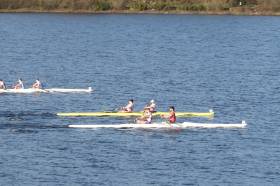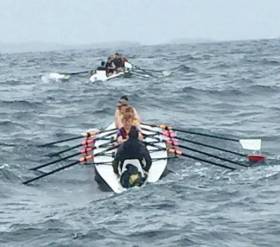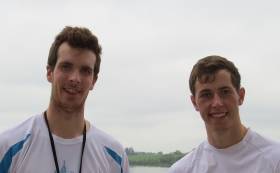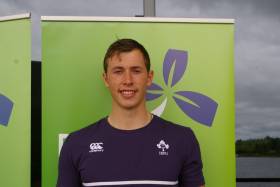Displaying items by tag: Boomer
Boomer and Crowley Pip O'Driscoll and O'Donovan at Ireland Trial
#Rowing: The new crew of Patrick Boomer and Fionnan Crowley beat Shane O’Driscoll and Mark O’Donovan in their second race of the day at the Ireland trial at the National Rowing Centre. Boomer, from Belfast Boat Club, and Castleconnell’s Crowley had just half a second to spare over the Skibbereen men.
The second session was run in bright sunshine and on good water. Chris Kirwan of St Michael’s and Grace Healy of Commercial were the top junior double – though racing from unfancied lane six. The men’s junior double was won by Andrew Sheehan of Lee and Aaron Keogh of Three Castles.
Denise Walsh and Aoife Casey, who may be the Ireland lightweight double for the season, looked impressive, while the under-23 four of Eimear Lambe, Claire Feerick, Emily Hegarty and Tara Hanlon also had a good win.
Sunday’s racing has been cancelled, because of a forecast of bad weather.
Ireland Trial, National Rowing Centre
Men
Pair: M O’Donovan, S O’Driscoll. Under-23: S O’Connell, A Goff
Jun Pair: S Daly/M Campion
Single Sculls
Lightweight: P O’Donovan. U-23 Lwt: M Taylor. Under-23: N Hull. Jun: J Kearney
Women
Pair: A Keogh, M Dukarska. Under-23: C O’Brien, K Shirlow. Jun: C O’Sullivan, J Duggan.
Single: S Puspure. Lightweight: D Walsh. U-23 Lwt: K Dolan. Jun: M Curry.
Second Session
Men
Pair: Boomer, Crowley
Four, Under-23: Goff, O’Connell, O’Rourke, Nolan
Four – Jun: Hume, Reidy, Allen, Siltanen.
Double – Lwt/U23: Sutton, Taylor. Jun: A Sheehan, A Keogh
Single – P O’Donovan. Jun: A Christie.
Women
Four – Lambe, Feerick, Hegarty, Hanlon. Jun: O’Donoghue, Tyther, McInerney, Murphy
Double – Walsh, Casey. Jun: C Kirwan, G Healy
Single: Puspure. (Jun/U23 lwt): K Dolan (u23), E Loftus.
#Rowing: Ireland crews reached multiple A Finals and had two fifth-place finishes at the World Coastal Rowing Championships in Sidney, Victoria in Canada.
The Myross men’s coxed quadruple of Kenny McCarthy, Vincent Browne, Andy O’Sullivan and James Lupton, with cox Ciara Deasy, finished fifth in their A Final. The race was won by Italy, who were well clear of second-placed Monaco, with France One taking bronze.
In the final of the men’s single, Patrick Boomer was also well placed behind the winner Eduardo Linares Ruiz. The Peruvian took the lead before half way and held on to dethrone Italy’s defending champion, Simone Martini, who took bronze. Lars Wichert of Germany was second.
Boomer, who was representing Loughros Point of Donegal, was fifth, well in touch with the medallists.
Ireland's women's crews also did well. Castletownbere's coxed quad of Emily Dulohery, Cliona O'Regan, Orla Gilsenan, Miriam Sheehan and cox Carmel Connolly finished sixth. Russia won from Spain and Monaco.
Diana Dymchenko of the Ukraine won the women’s single. Sionna Healy of Arklow was eighth and Laura O’Neill of Kilmacsimon 12th.
World Coastal Rowing Championships, Sidney, Victoria, Canada (Selected Results; Irish interest)
Men
Quadruple, coxed: 1 Italy (CC Saturnia) 22 mins 14 secs, 2 Monaco, 3 France One; 5 Myross, Ireland (K McCarthy, V Browne, A O’Sullivan, J Lupton; cox: C Deasy) 23:46.9.
Single: 1 Peru (E Linares Ruiz) 26:30.2, 2 Germany Two, 3 Italy; 5 Ireland One, Loughros Point (P Boomer) 27:23.4.
Women
Quadruple, coxed: 1 Russia 25:18.0, 2 Spain One, 3 Monaco; 6 Castletownbere, Ireland (E Dulohery, C O’Regan, O Gilsenan, M Sheehan; cox: C Connolly) 27:56.
Single – 1 Ukraine (D Dymchenko) 28:56.7, 2 Netherlands, 3 France Two; 8 Ireland One (S Healy, Arklow) 31.38.2; 12 Ireland Three (L O’Neill, Kilmacsimon) 33:25.1.
Boomer Best at Offshore Rowing Championships
#Rowing: Patrick Boomer won the single sculls at the Irish Offshore Championships at O’Carroll’s Cove near Caherdaniel in Kerry. Boomer represented Loughros Point in Donegal and hopes to go on to row for them at the World Coastal Rowing Championships in Canada in October.
John Whooley of Skibbereen won a title – for Arklow. The Corkman teamed up with Alan Goodison to take the men’s double.
Kerry club Killorglin won the women’s quadruple and Arklow the women’s double.
The final of the men’s quadruple, the women’s single and the mixed double will take place on Sunday as the wind made conditions unsuitable on Saturday.
Irish Offshore Championships, Kerry
Men
Double: Arklow (J Whooley, A Goodison) 20.17.
Single: Loughros Point, Donegal (P Boomer).
Women
Quadruple: Killorglin (E O’Donovan, A Tyther, K Boyle, R O’Donoghue; D Leahy) 22:48.
Double: Arklow (R Ireson, MA Kent).
Boomer and Harrington Complete Programme at World Cup Rowing
#Rowing: Ireland’s Patrick Boomer and Andy Harrington finished fifth in the D Final of the men’s pair at the World Cup Regatta in Lucerne this morning. Poland led from start to finish, and while Ireland moved out of the sixth as the race went on they did not break into the leading group of Poland, Switzerland and Australia.
World Cup Regatta, Lucerne, Day Two (Irish interest; selected results)
Men
Pair – D Final (Places 19 to 24): 1 Poland 6:40.95; 5 Ireland (P Boomer, A Harrington) 6:53.83.
O'Donovan and O'Driscoll Given Big Test
#Rowing: Sanita Puspure and Paul O’Donovan were impressive winners of the single sculls tests at the Ireland trial at the National Rowing Centre today. Shane O’Driscoll and Mark O’Donovan won their pairs race, but only by 2.8 seconds from the very tall crew of Andy Harrington and Patrick Boomer.
Denise Walsh won the lightweight single sculls from Margaret Cremen. Aoife Casey was absent because of exams. The top women’s pair were Aifric Keogh and Emily Hegarty, while Aaron Keogh of Three Castles beat Rory O’Neill of Castleconnell in the junior single sculls.
Repechage Place for Ireland Pair after Sixth in World Rowing Heat
#Rowing: Ireland had to settle for sixth place in the first heat of the men’s pair at the World Rowing Championships in Sarasota-Bradenton in Florida today. The new crew of Fionnán McQuillan-Tolan and Patrick Boomer were never realistic contenders for one of the first two places, which would have sent them directly to the A/B semi-finals. They are now set for a repechage on Tuesday (5.24 or 5.29 Irish time).
Ireland’s three lightweight crews won their heats: single sculler Denise Walsh secured her win with a sprint finish, while Paul O’Donovan and the pair of Mark O’Donovan and Shane O’Driscoll won relatively easily.
World Rowing Championships, Sarasota-Bradenton, Florida – Day One – Irish Interest:
Men
Pair – Heat One (First two to A/B Semi-Final; rest to Repechage): 1 Italy 6:27.88, 2 France 6:33.03; 6 Ireland (F McQuillan-Tolan, P Boomer) 6:50.82.
Lightweight Pair – Heat One (First to A Final; rest to Repechage): 1 Ireland (M O’Donovan, S O’Driscoll) 6:33.20, 2 Britain (J Cassells, S Scrimgeour) 6:38.57, 3 Italy 6:40.39.
Lightweight Single Sculls – Heat Three (First Four to Quarter-Finals; rest to Repechages): 1 Ireland (P O’Donovan) 6:54.68, 2 Brazil 7:05.75, 3 Italy 7:09.88, 4 Thailand 7:17.50.
Women
Lightweight Single Sculls – Heat Three (First Three to A/B Semi-Finals; rest to Repechages): 1 Ireland (D Walsh) 7:43.87, 2 South Africa 7:44.38, 3 Italy 8:03.34.
Fine Finish Sees Ireland Into Second World Rowing A Final
#Rowing: Ireland’s under-23 lightweight quadruple joined the under-23 lightweight pair at the A Final stage of the Under-23 World Championships in Rotterdam. The crew of Fintan McCarthy, Shane O’Connell, Stephen O’Connor and stroke Colm Hennessy finished second to Britain in a fine semi-final. Ireland and Sweden held the qualifying places behind Britain for a good part of the course, but New Zealand mounted an attack in the final third. Ireland upped their rate and held out for second, with Sweden also moving into the A Final.
The under-23 heavyweight quadruple finished fifth in their semi-final. The race was won by Australia, with New Zealand and Britain booking their A Final places by taking second and third. Ireland fought with Ukraine to avoid last and held out at the end to win this battle.
World Rowing Championships, Rotterdam (Irish interest; selected results)
Men
Under-23 Lightweight Pair - Semi-Finals (First Three to A Final; rest to B Final) - Semi-Final One: 1 Greece 6:39.18, 2 Switzerland 6:40.01, 3 China 6:44.52. Semi-Final Two: 1 Ireland (S Mulvaney, D O’Malley) 6:46.20, 2 Turkey 6:49.11, 3 United States 6:50.75.
Under-23 Quadruple - Semi-Finals (First Three to A Final; rest to B Final) - Semi-Final One: 1 Poland 5:51.05, 2 Italy 5:52.38, 3 Germany 5:52.53. Semi-Final Two: 1 Australia 5:54.34, 2 New Zealand 5:56.53, 3 Britain 5:56.93; 5 Ireland (D Buckley, J Casey, P Boomer, S McKeown) 6:12.94.
Under-23 Lightweight Quadruple - Semi-Finals (First Three to A Final; rest to B Final) - Semi-Final One: 1 Italy 6:07.44, 2 Canada 6:09.42, 3 Germany 6:10.05. Semi-Final Two: 1 Britain 6:06.01, 2 Ireland (F McCarthy, S O'Connell, S O'Connor, C Hennessy) 6:07.18, 3 Sweden 6:07.28.
Ireland Quadruple Makes World Rowing Semi-Finals
#Rowing: Ireland’s under-23 heavyweight quadruple qualified for the semi-finals at the World Rowing Championships in Rotterdam today. The crew of Daniel Buckley, Jack Casey, Patrick Boomer and Sam McKeown took the third qualification place behind Britain and Russia in their repechage. They join the Ireland under-23 lightweight pair and lightweight quadruple, which qualified from their heats.
World Rowing Championships, Rotterdam (Selected Results; Irish interest)
Men
Under-23 Quadruple - Repechage One (Three to A/B Semi-Finals; rest to C Final): 1 Britain 5:54.05, 2 Russia 5:56.18, 3 Ireland (D Buckley, J Casey, P Boomer, S McKeown) 5:57.67.


































































